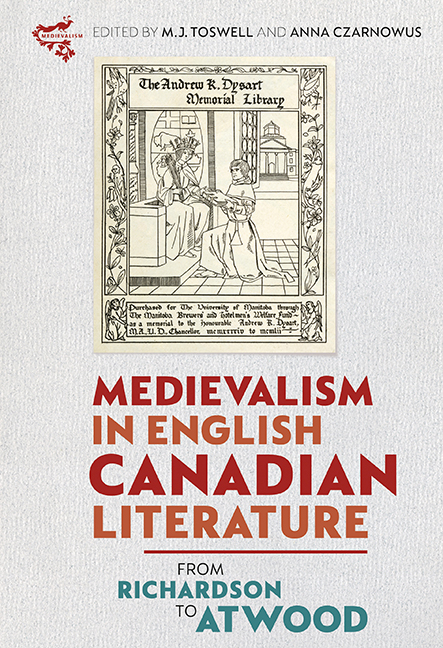Book contents
- Frontmatter
- Contents
- Introduction: English Canadian Medievalism
- 1 “Men of the North”: Archibald Lampman's Use of Incidents in the Lives of Medieval Monarchs and Aristocrats
- 2 “Going Back to the Middle Ages”: Tracing Medievalism in Julia Beckwith Hart's St. Ursula's Convent and John Richardson's Wacousta
- 3 John Richardson's Wacousta and the Transfer of Medievalist Romance
- 4 A Canadian Caliban in King Arthur's Court: Materialist Medievalism and Northern Gothic in William Wilfred Campbell's Mordred
- 5 Orientalist Medievalism in Early Canadian Periodicals
- 6 The Collegiate Gothic: Legitimacy and Inheritance in Robertson Davies's The Rebel Angels
- 7 Earle Birney as Public Poet: a Canadian Chaucer?
- 8 “That's what you get for being food”: Margaret Atwood's Symbolic Cannibalism 129
- 9 Lost in Allegory: Grief and Chivalry in Kit Pearson's A Perfect, Gentle Knight
- 10 Remembering the Romance: Medievalist Romance in Fantasy Fiction by Guy Gavriel Kay and Charles de Lint
- 11 Medievalisms and Romance Traditions in Guy Gavriel Kay's Ysabel
- 12 The Medieval Methods of Patrick DeWitt: Undermajordomo Minor
- Index
- Miscellaneous Endmatter
12 - The Medieval Methods of Patrick DeWitt: Undermajordomo Minor
Published online by Cambridge University Press: 25 March 2020
- Frontmatter
- Contents
- Introduction: English Canadian Medievalism
- 1 “Men of the North”: Archibald Lampman's Use of Incidents in the Lives of Medieval Monarchs and Aristocrats
- 2 “Going Back to the Middle Ages”: Tracing Medievalism in Julia Beckwith Hart's St. Ursula's Convent and John Richardson's Wacousta
- 3 John Richardson's Wacousta and the Transfer of Medievalist Romance
- 4 A Canadian Caliban in King Arthur's Court: Materialist Medievalism and Northern Gothic in William Wilfred Campbell's Mordred
- 5 Orientalist Medievalism in Early Canadian Periodicals
- 6 The Collegiate Gothic: Legitimacy and Inheritance in Robertson Davies's The Rebel Angels
- 7 Earle Birney as Public Poet: a Canadian Chaucer?
- 8 “That's what you get for being food”: Margaret Atwood's Symbolic Cannibalism 129
- 9 Lost in Allegory: Grief and Chivalry in Kit Pearson's A Perfect, Gentle Knight
- 10 Remembering the Romance: Medievalist Romance in Fantasy Fiction by Guy Gavriel Kay and Charles de Lint
- 11 Medievalisms and Romance Traditions in Guy Gavriel Kay's Ysabel
- 12 The Medieval Methods of Patrick DeWitt: Undermajordomo Minor
- Index
- Miscellaneous Endmatter
Summary
PATRICK DEWITT WOULD be more surprised than anyone to find himself the focus of a chapter in a book on Canadian medievalism. For DeWitt, nationality seems a matter of accident – “life happens … you just wind up where you wind up” – and his medievalism might also best be described as accidental. De- Witt was born in Sidney, British Columbia, and left Canada when he was 20. Until he began to publish with House of Anansi Press, he characterized his relationship with Canada as “slight.” Canada, however, embraced DeWitt, honouring his second novel, The Sisters Brothers, with both the Governor General's Award for English Language Fiction (2011) and the Stephen Leacock Memorial Medal for Humour (2012). Every other writer in this volume is still more distinctly Canadian than De- Witt: DeWitt does not display his Canadian identity like Robertson Davies, Earle Birney, and Margaret Atwood, and he does not connect any of his books to Canada like Guy Gavriel Kay or Charles de Lint, with their well-known settings in Toronto and Ottawa. Further, where the introduction to this volume makes the important distinction between notional and direct medievalism, demonstrating that Canadian medievalism is often direct (that is, a specific response to reading and studying medieval texts in their original form), DeWitt's medievalism could be argued to fall short even of the standard of notional, which at least assumes some intentionality. DeWitt dropped out of high school, unlike the mostly university-educated authors of this volume, and his engagement with the medieval seems neither to come from reading medieval texts nor from reading texts of medievalism. Instead, and I believe uniquely, DeWitt's attention to story is what draws him into the world of medievalism. As we will see, Tolkien and DeWitt share remarkable similarities, but perhaps even more remarkable is that Tolkien's work is the height of direct medievalism while DeWitt's is, indeed, a kind of accident resulting from immersion in folktale, a genre that predates yet still permeates the medieval.
Though there have not, to date, been any full critical analyses of Patrick DeWitt’s third novel, Undermajordomo Minor (2015), the book has been widely and enthusiastically reviewed. Several of the reviews mention The Sisters Brothers, noting that DeWitt's earlier novel “gleefully subverts” or “reinvents” the genre or “conventions of the traditional Western,” calling the book “a take on the western.”
- Type
- Chapter
- Information
- Medievalism in English Canadian LiteratureFrom Richardson to Atwood, pp. 189 - 204Publisher: Boydell & BrewerPrint publication year: 2020



